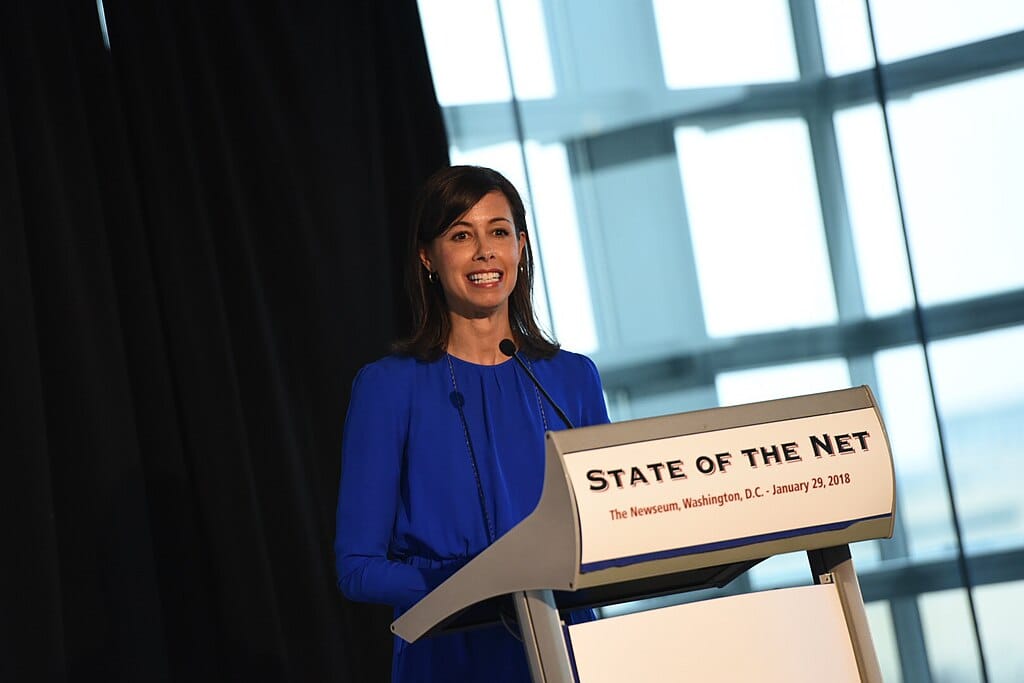ACAM Speed Proposal, AI Commission Bill, 123Net Nets $65M for Michigan Builds
The FCC is close to authorizing a higher speed requirement for funding to certain high-cost areas.
Quinn Nghiem

June 20, 2023 – Federal Communications Commission Chairwoman Jessica Rosenworcel revealed a plan to introduce an Enhanced Alternative Connect America Cost Model that would mandate internet providers under the program to offer faster internet speeds in eligible areas.
“To keep pace with the demand for reliable broadband and meet the needs of consumers today and into the future, we need to optimize these programs to bring higher speeds and greater bandwidth to consumers,” Rosenworcel said Friday in a press release.
The ACAM program, established in 2016, provides monthly funding for internet carriers serving high-cost and underserved areas in exchange for broadband deployment to eligible locations. If adopted, the revised ACAM standard will mandate ISPs to boost their customers’ connection speeds to 100/20 Mbps or higher in exchange for an extension of the program and a larger subsidy.
This announcement follows a request made by the ACAM broadband coalition over a year ago, urging an increase in broadband deployment requirements from the existing federal standard of 25 Mbps and 3 Mbps upload to the 100/20 Mbps benchmark, set by the Infrastructure, Investment, and Jobs Act.
“The Enhanced A-CAM program would complement existing federal, state, and local funding programs, including the Broadband Equity, Access, and Deployment program, authorized by the Bipartisan Infrastructure Law,” read the statement.
Bill would introduce a federal commission to address AI regulation
A bipartisan group of legislators introduced a bill Tuesday to create a federal commission to develop strategies for regulating artificial intelligence.
The bill, called the National AI Commission Act, will direct Congress to form a group of 20 experts across government, industry, civil society, and technology to develop a comprehensive, risk-based framework for AI regulation.
The commission will produce three reports on AI regulatory recommendations and enforcement actions after six months, one year, and two years, according to the legislation.
“The National AI Commission Act is an important first step to bring together stakeholders and experts to better understand how we can regulate AI and what guardrails must be in place as AI become more prevalent across society,” said rep. Anna Eshoo, D-CA – who co-sponsored the bill along with reps. Ted Lieu, D-CA, and Ken Buck, R-CO – in a statement.
The bill is the latest development in a series of legislative efforts to set guardrails for AI development.
Since the introduction of ChatGPT in late 2022, the surge in interest surrounding generative AI has sparked a flurry of hearings and legislative proposals. These initiatives aim to create regulations that safeguard consumers against disinformation, protect data privacy, and advocate for the establishment of a new federal agency responsible for overseeing digital platforms.
Fixed wireless provider gets $65M for Michigan projects
Fixed wireless service provider 123Net secured $65 million in funding for broadband deployment in Allegan County, Michigan.
123NET will construct 1,100 miles of high-capacity fiber with internet speeds of up to 10 gigabits per second to more than 10,000 unserved and underserved homes across the county. The company expects the construction phase will span the next two years.
The funding was granted through the Realizing Opportunity with Broadband Infrastructure Networks, a $238-million infrastructure grant program supported by the Treasury Department’s Capital Projects Fund.
“We are honored and excited to be chosen by the Michigan High Speed Internet Office to meet the needs for unserved and underserved residents in Allegan County,” Dan Irvin, CEO of 123NET, said in a press release Tuesday. “We look forward to partnering with additional communities throughout Michigan in a combined effort to make this state the best connected on the planet.”











Member discussion